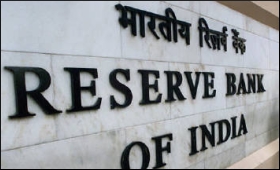|
|
|

|
RBI may defer rate cut in Oct
|
|

|
|
| Top Stories |
 |
|
|
|
SME Times News Bureau | 15 Sep, 2020
The elevated inflation is unlikely to push the Monetary Policy Committee
(MPC) to effect any immediate rate cut in its policy next month but a
cut thereafter may be possible owing to the possibility of a sharp
reduction in inflation in line with tepid demand conditions, analysts
said on Tuesday.
"The retail inflation and WPI inflation data
released yesterday do not indicate any major build-up. While this will
reassure the RBI, the elevated retail and rising core inflation seems to
rule out a rate cut in the next policy. We expect a 50bp rate cut
thereafter during FY21," Anand Rathi said in its research report on
inflation.
The report added that after remaining flat in Aug'20
vs Jul'20, inflation is likely to soften modestly in the next two months
due to the base effect. A steeper fall is likely thereafter, and this
may once again give an opportunity to the MPC to look at rate cuts to
boost the economy.
The data released by the National Statistical
Office (NSO) on Monday showed that India's August retail inflation
remained flat at 6.69 per cent, down marginally from 6.73 per cent in
July.
As per the data, Covid-19 seems to have changed the food
habits of people. Accordingly, at 9.1% in Aug'20, food inflation was the
lowest since Nov'19.
While inflation in prices of pulses, cereals, meat, spices and milk softened, that of eggs and alcoholic beverages hardened.
But
core inflation remained at a 22-month high at 5.8%, while inflation for
transport and communication, personal care, and footwear accelerated.
In addition, several essential items remained in the high-inflation
zone. These include pulses, edible oils, spices, and vegetables.
India
is bucking the global deflationary trend. Inflation in India - both
overall and core - remains in the top three of the major economies
(G-20) while the country also has one of the lowest (negative) real
policy rates of these economies, the brokerage report said.
|
|
|
| |
|
|
|
|
|
|
|
|
|
|
|
|
|
|
| |
| Customs Exchange Rates |
| Currency |
Import |
Export |
US Dollar
|
₹91.2
|
₹89.5 |
UK Pound
|
₹123.35
|
₹119.35 |
Euro
|
₹107
|
₹103.35 |
| Japanese
Yen |
₹57.9 |
₹56.1 |
| As on 22 Jan, 2026 |
|
|
| Daily Poll |
 |
 |
| What is your primary "Make or Break" expectation from the Finance Minister this year? |
|
|
|
|
|
| Commented Stories |
 |
|
|
|
|
|
| |
|